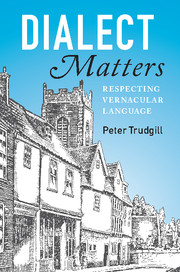Book contents
- Frontmatter
- Dedication
- Epigraph
- Contents
- Foreword
- Acknowledgements
- Map
- Themes
- 1 History: how things came to be this way
- 2 Prescriptivism and other useless pastimes
- 3 Language change: observing and accepting it
- 4 What is happening to words?
- 5 Languages and dialects in contact and conflict
- 6 Respecting English grammar
- 7 Respecting ordinary language
- 8 Sounds and fury
- 9 Respecting local speech
- 10 Grammar: the wonder of it all
- 11 More about words
- 12 Origins
- 13 Accent rules
- 14 Respecting names
- Postscript
- Index
7 - Respecting ordinary language
Published online by Cambridge University Press: 05 August 2016
- Frontmatter
- Dedication
- Epigraph
- Contents
- Foreword
- Acknowledgements
- Map
- Themes
- 1 History: how things came to be this way
- 2 Prescriptivism and other useless pastimes
- 3 Language change: observing and accepting it
- 4 What is happening to words?
- 5 Languages and dialects in contact and conflict
- 6 Respecting English grammar
- 7 Respecting ordinary language
- 8 Sounds and fury
- 9 Respecting local speech
- 10 Grammar: the wonder of it all
- 11 More about words
- 12 Origins
- 13 Accent rules
- 14 Respecting names
- Postscript
- Index
Summary
This section again argues for the legitimacy and value of vernacular language, as the previous section did with respect to grammar, but here I attempt to do this with respect to the normal everyday usage of words and phrases. In particular, I argue against the use of the form of business-school terminology which is intended to commodify more or less everything. And I attempt to point out the value of discourse markers such as well and like. One problem that English-speaking people have is that most of us know very little about our language because we have not been taught very much about it at school; but we are particularly ill-informed about the nature of our spoken language. So much more attention is focussed on written English that many essential features of the spoken language can easily be thought of as aberrations. In fact, we spend so very much more of our lives speaking than writing that, if anything, it is the written form of the language which is aberrant.
Well
When we were about 6 years old, there was a joke which we thought was very funny: “Have you heard about the three deep holes? Well, well, well … ”.
I agree it is not very amusing, but a correspondent to the EDP seems not even to have heard of it. He is “irritated beyond bounds”, poor chap, by the continuous use of the word well at the start of “almost every report on the news”. He wants the word to be banned, unless it applies to a person's state of health, or a hole in the ground which supplies water. He does not say how he will set about enforcing this ban; I suppose a short prison-sentence for any offending journalist might work.
But he has completely missed the point about the important role words like well play in English, or in any language. They are called discourse markers, and they have very important functions. There are rules about how to use them which we all know, even if we do not know we know them. You can sometimes hear foreigners using well incorrectly because they do not know what the rules are.
Information
- Type
- Chapter
- Information
- Dialect MattersRespecting Vernacular Language, pp. 104 - 121Publisher: Cambridge University PressPrint publication year: 2016
